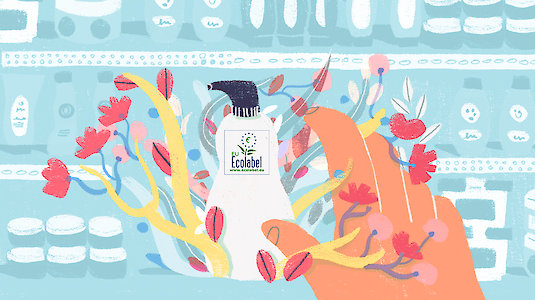Seal of quality: credibility as a trump card against greenwashing
14 October is World Ecolabel Day - on this occasion we celebrate credible quality labels such as the Austrian or European Ecolabel. They also provide orientation and security in the fight against greenwashing.
Greenwashing as a worrying trend
We have often dealt with greenwashing here, given practical tips against it and described how companies use various PR strategies to put a green cloak around themselves or their products and services - although there is no factual basis for it. Our colleagues from the VKI consistently and objectively uncover a case of greenwashing every month in the Greenwashing Check - you can read about it at www.vki.at/greenwashing. There is also the possibility to report greenwashing.
Credible seals of approval against greenwashing
One greenwashing strategy is to use so-called "fake labels" - this ranges from the use of completely invented seals without underlying criteria to the use of non-transparent labels to certifications that make untenable promises. Concrete examples prepared by the VKI of an Austrian wine label ("Nachhaltig Austria") that promises more sustainability than it can deliver and of an Amazon label ("Compact by Design“") with very low standards can be freely read - and give an impression of the extent to which labels can also mislead consumers.
This is why it is so important to be able to distinguish between credible and untrustworthy labels. In the following, we would like to give a few tips and hints on how to recognise such credible labels:
- One indication of credibility is transparency: Credibility also goes hand in hand with the publication of the criteria behind a certification - so that consumers can get a clear picture of what the label actually does.
- In the course of this, it can be checked whether the criteria comprehensively address all relevant points - so-called ISO Type 1 quality labels such as the Austrian Ecolabel or the European Ecolabel, but also the Blue Angel or the Nordic Swan, are based on criteria that always try to address as many environmentally relevant aspects of a product as possible. This is important to ensure that certified products are not optimised in only one aspect (e.g. with regard to climate impact), while other aspects are left out (e.g. the impact on biodiversity).
- The label operator also gives an indication: Are they public, state labels (such as those mentioned above) or industry-owned labels? In principle, one can assume independence from economic interests in the case of state labels. However, the respective label operator itself only offers an indication of credibility - so there are also sometimes, e.g. in the organic food sector, seals of private associations that go beyond the state requirements (EU organic seal).
- Another important point is communication: less is often more. Big promises are often the "blue sky" and an indication of greenwashing - in the sense of "too good to be true". Reputable seals of approval communicate very clearly and precisely what they do - this may sometimes sound less exciting, but it is watertight.
Conclusion
Greenwashing is often not easy to recognise - and so even credible quality labels are not always identifiable as such at first glance. But it is a fact that state labels such as the Austrian Ecolabel or the European Ecolabel are serious insofar as they make reliable promises - on the basis of published and thus transparent criteria that cover all central aspects. In this way, consumers can decide for themselves whether the products and services awarded such labels meet their own expectations in terms of sustainability.
